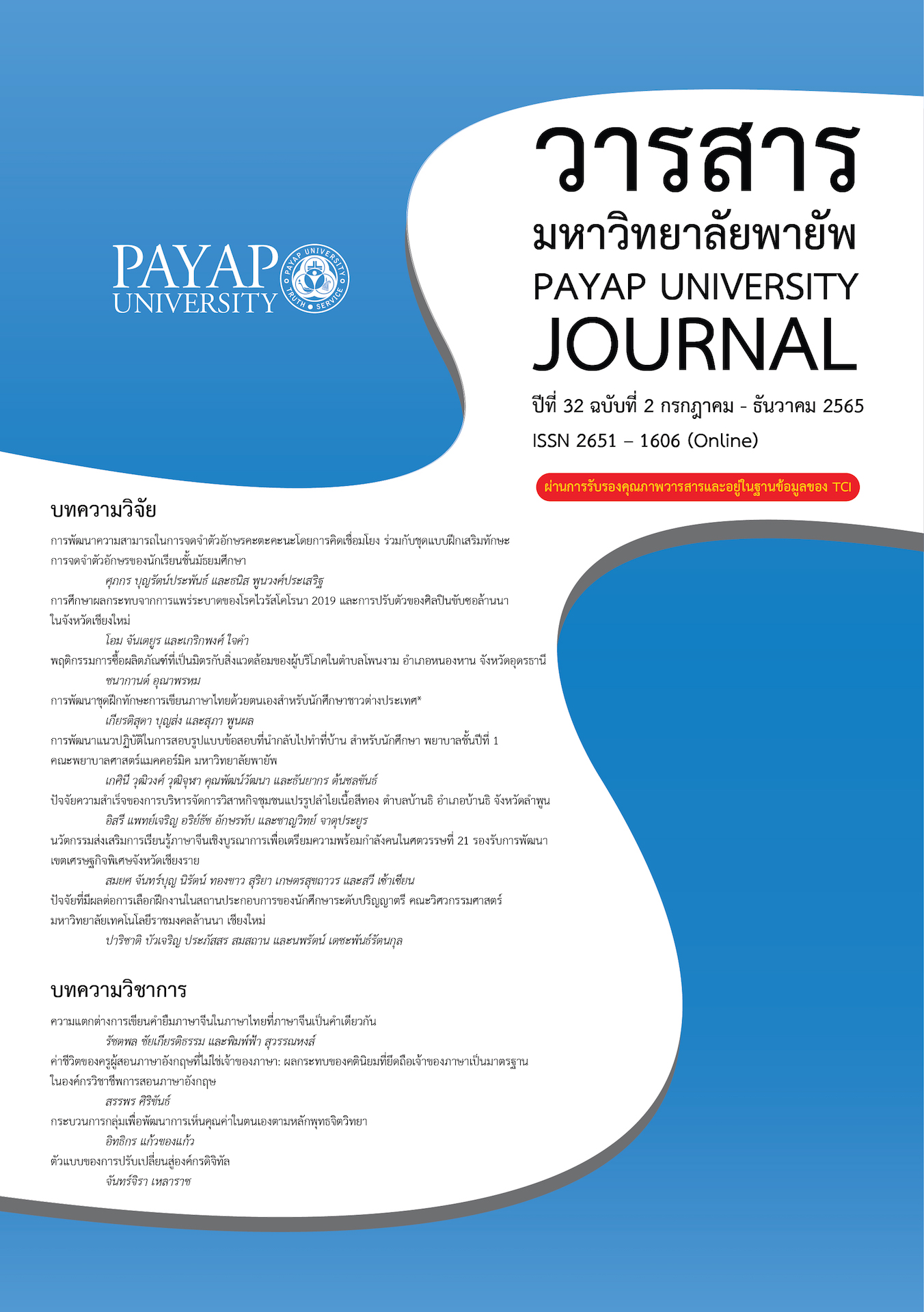ค่าชีวิตของครูผู้สอนภาษาอังกฤษที่ไม่ใช่เจ้าของภาษา: ผลกระทบของคตินิยมที่ยึดถือเจ้าของภาษาเป็นมาตรฐานในองค์กรวิชาชีพการสอนภาษาอังกฤษ
Main Article Content
บทคัดย่อ
จุดประสงค์ของบทความนี้คือ เพื่อชี้ประเด็นการเหยียดเชื้อชาติ อัตลักษณ์ของครูผู้สอนและการเลือกปฏิบัติในการจ้างงาน ซึ่งเป็นผลกระทบของคตินิยมที่ยึดถือเจ้าของภาษาเป็นมาตรฐานที่มีต่อครูผู้สอนที่ไม่ได้เป็นเจ้าของภาษาในองค์กรวิชาชีพการสอนภาษาอังกฤษ โดยได้อภิปรายเนื้อหาที่เกี่ยวข้องและผลที่เกิดในแต่ละประเด็น พร้อมรวบรวมข้อเสนอแนะในการแก้ปัญหาถึงผลกระทบ เพื่อก้าวข้ามคตินิยมที่ยึดถือเจ้าของภาษาเป็นมาตรฐานที่ยังคงมีอยู่ในองค์กรวิชาชีพการสอนภาษาอังกฤษ ซึ่งส่งผลต่อครูผู้สอนที่ไม่ได้เป็นเจ้าของภาษาที่ต้องเผชิญต่อความท้าทายในเส้นทางอาชีพของตน ทั้งนี้หวังว่าประเด็นที่นำเสนอจะกระตุ้นให้ผู้มีส่วนเกี่ยวข้องทุกฝ่ายได้ตระหนักรู้ถึงความ เหลื่อมล้ำ การเลือกปฏิบัติ โดยคำนึงถึงความสำคัญของทุกชีวิตทั้งครูผู้สอนที่เป็นเจ้าของภาษาและไม่ใช่เจ้าของภาษา สนับสนุนความเป็นมืออาชีพในการสอนภาษาอังกฤษ เพื่อให้สอดคล้องต่อสถานะและบทบาทของภาษาอังกฤษในปัจจุบัน ที่มีสถานะเป็นภาษาโลกเป็นภาษาของทุกคน โดยมิได้ยึดโยงหรืออิงต่อคำ ‘มาตรฐาน’ ที่กำหนดโดยคนกลุ่มใดกลุ่มหนึ่งอีกต่อไป
Article Details
เอกสารอ้างอิง
Amin, N. (1997). Race and the identity of the non-native ESL teacher. TESOL Quarterly, 31(3), 580-582.
Bissett, J., & Ma, J. (2015). Attitudes of Korean university students towards English pronunciation. Foreign Language Education Research, 18, 1-15.
Bolnilla-Silva, E. (2010). Racism without racists: Color-blind racism and the persistence of racial inequality in America. Rowman & Littlefield.
Boonsuk, Y., Ambele, E., & McKinley, J. (2021). Developing awareness of global Englihses: Moving away from ‘native standards’ for Thai university ELT. System, 99, 1-11.
Braine, G. (2010). Non-native speaker English teachers: Research, pedagogy, and professional growth. Routledge.
Brutt-Griffler, J., & Samimy, K. (2001). Transcending the nativeness paradigm. World Englishes, 20(1), 99–106.
CATESOL (2013, October 5). CATESOL position paper opposing discrimination against non-native English speaking teachers (NNESTs) and teachers with “non-standard” varieties of English. http://catersol.org/nnest.pdf
Davies, A. (1991). The native speakers in applied linguistics. Edinburgh University Press.
English Teaching Thailand. (n.d.). Home [Facebook page]. Facebook. Retrieved March 8, 2021 from https://www.facebook.com/groups/TEFLTHAILAND/
Galloway, N., & Rose, H. (2015). Introducing global Englishes. Routledge.
Graddol, D. (2006). English next: Global English may mean the end of ‘English as a foreign language’. British Council.
Jenkins, J. (1998). ‘Which pronunciation norms and models for English as an international language?.’ ELT Journal, 52(2), 119–26.
Jenkins, J. (2000). The phonology of English as an international language. Oxford University Press.
Jenkins, S. (2017). The elephant in the room: Discriminatory hiring practices in ELT. ELT Journal, 71(3), 373-376.
Jindapitak, N., & Teo, A. (2012). Thai tertiary English majors’ attitude towards and awareness of world English. Journal of English Studies, 7, 74–116.
Kabel, A. (2009). Native-speakerism, stereotyping and the collusion of applied linguistics. System, 37(1), 12–22.
Kamhi-Stein, L. D. (2016). The non-native English speaker teachers in TESOL movement. ELT Journal, 70(2), 180-189.
Kang, O., & Rubin, L. (2009). Reverse linguistic stereotyping: Measuring the effect of listener expectations on speech evaluation. Journal of Language and Social Psychology, 28(4), 441– 456.
Kiczkowiak, M. (2015). Native speakers only. IATEFL Voices, 2(243), 8–9.
Kachru, B. (1992). The other tongue: English across culture. University of Illinois Press.
Kubota, R. (2002). The author responds: (Un) raveling racism in a nice field like TESOL. TESOL Quarterly, 36(1), 84-92.
Kubota, R. (2020). Confronting epistemological racism, decolonizing scholarly Knowledge: Race and gender in applied linguistics. Applied Linguistics, 41(5), 712–732.
Kubota, R., & Fujimoto, D. (2013). Racialized native speakers: Voices of Japanese American English language professionals. In S. Houghton & D. J. Rivers (Eds.), Native-speakerism in Japan: Intergroup dynamics in foreign language education (pp. 196–206). Multilingual Matters.
Liu, J. (1999). Nonnative-English-speaking professionals in TESOL. TESOL Quarterly, 33(1), 85–102.
Norton, P. B. (1995). Social identity, investment, and language learning. TESOL Quarterly, 29(1), 9–31.
Matsuda, A. (2003). Incorporating world Englishes in teaching English as an international language. TESOL Quarterly, 37(4), 719-729.
Methitham, P. (2014). Survey the landscape of ELT in Thailand: Offering new possibility for change. The 2014 WEI International Academic Conference Proceedings (pp. 26-34). Budapest, The West East Institute.
Phillipson, R. (1992). Linguistic imperialism. Oxford University Press.
Phuengpitipornchai, K., & Teo, A. (2021). Thai English, acceptable or just likable?: A study of foreign tourists’ perception of Thai English. Journal of Studies in the English Language, 16(1), 86-118.
Rai, L., & Deng, C. (2014). Glocalisation and English language education in Chinese context. Globalisation, Societies and Education, 14(1), 127–144.
Rivers, D. J., & Ross, A. S. (2013). Idealized English teachers: The implicit influence of race in Japan. Journal of Language, Identity & Education, 12(5), 321-339.
Ruecker, T., & Ives, L. (2015). White native English speakers needed: The rhetorical construction of privilege in online teacher recruitment spaces. TESOL Quarterly, 49(4), 733–756.
Sangboon, S. (2012). English as a foreign language teaching: From past to present. Pasaa Paritat Journal, 27, 89-104.
TESOL. (2006, March). Position statement against discrimination of nonnative speakers of English in the field of TESOL. https://www.tesol.org/docs/pdf/5889.pdf
Women of Color in ELT [@WOCinELT]. (2021, July 27). A deeper understanding of the experiences of NNESTs and non-white teachers should be made aware to avoid negative assumptions. [Tweet]. Twitter. https://twitter.com/WOCinELT
Wong, R. (2018). Non-native EFL teachers’ perception of English accent in teaching and learning: Any preference?. Theory and Practice in Language Studies, 8(2), 177-183.
Yim, S., & Hwang, K. (2019). Expatriate ELT teachers in Korea: Participation and sense of belonging. ELT Journal, 73(1), 72–81.


